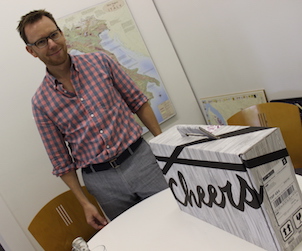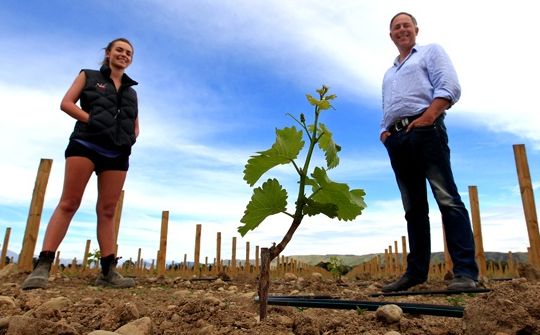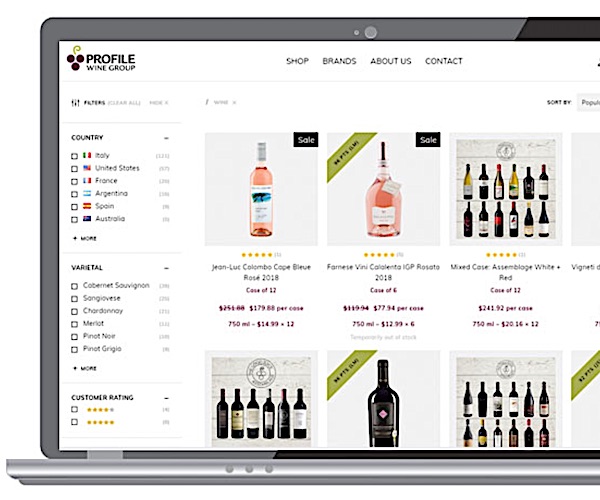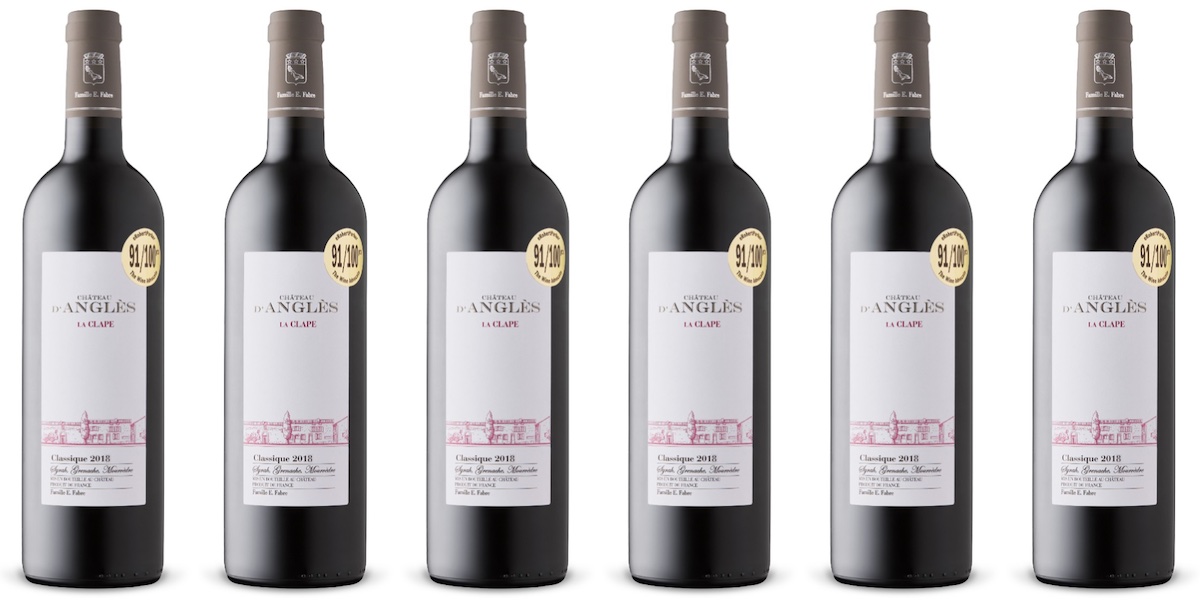Malcolm Jolley meets an Ontario mail order wine pioneer.
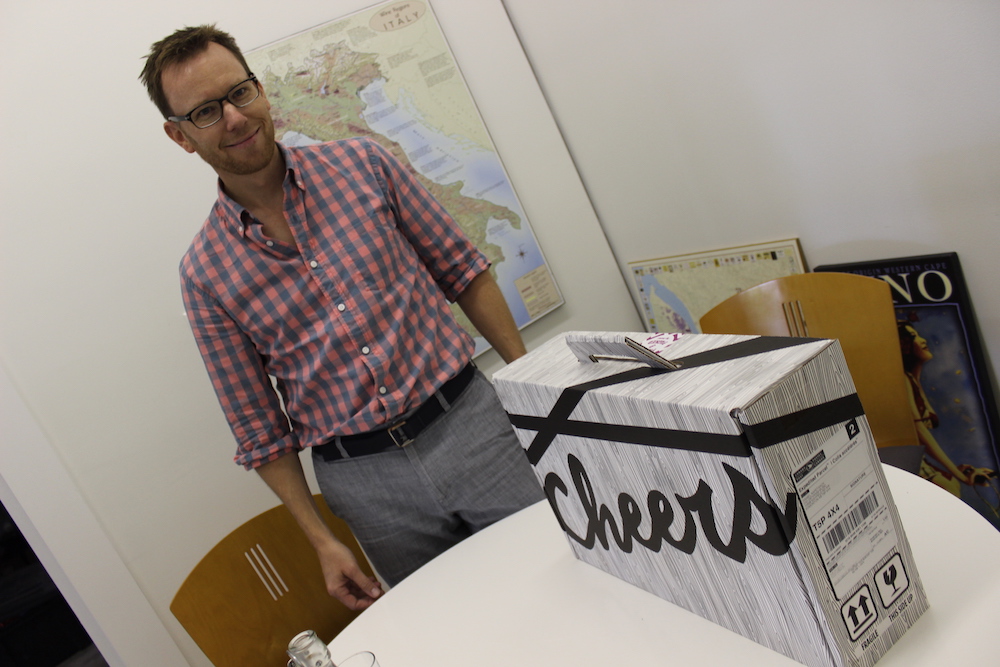
Justyn Smyczyk with a Kwäf Box.
When the LCBO recently announced the launch of their ecommerce capability, Justyn Smyczyk wrote a blog post (here) that made the rounds in the wine writing world. It’s a pretty withering take down of the service, written by someone who knows a thing or two about selling wine online, and in the mail, in Canada. Smyczyk is the co-founder, along with journalist and CityBites editor Dick Snyder, of Kwäf. I’d heard of Kwäf, because of Snyder’s involvement and the involvement of sommeliers (and sonetimes GFR contributors) Lindsay Groves and Zoltan Szabo. I took the opportunity to look up Smyczyk at his East End Toronto offices and ask him about Kwäf and creating an alternative wine buying service in Ontario.
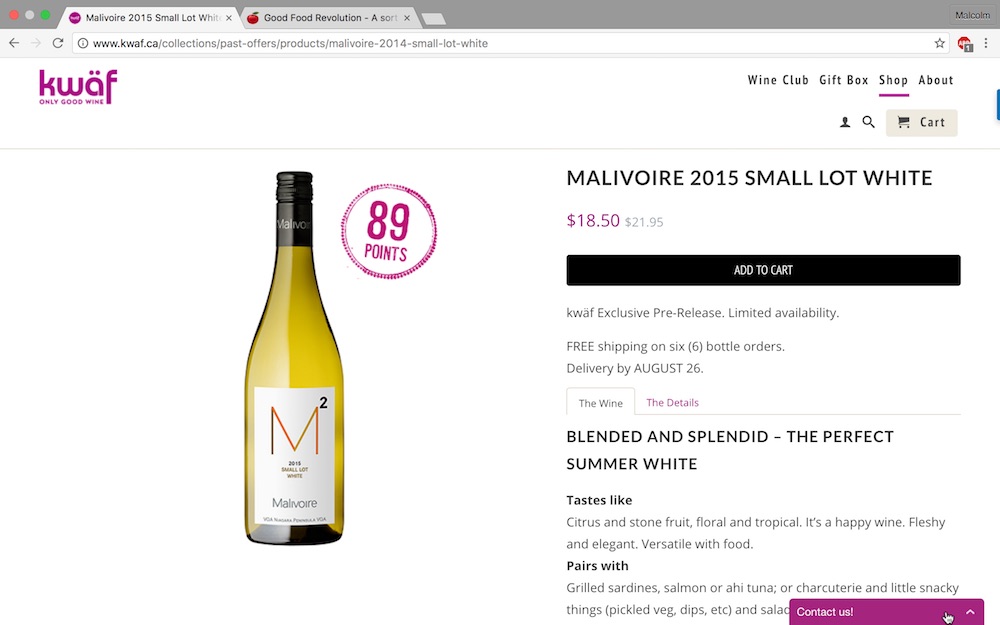
This interview has been edited for clarity, length and style.
Good Food Revolution: How does Kwäf work?
Justyn Smyczyk: At any given time, we’ll call in and solicit 10 or 15 local wineries and ask them what they have in stock that they think is tasting really good. We’re looking for wine that’s unique, and that’s been made in smaller batches. So, it’s mostly stuff that doesn’t go into the LCBO. The wineries send us wines and we sit down as a panel. I work with two sommeliers [Lindsay Groves and Zoltan Szabo] and a wine expert [Dick Snyder]. We taste the wines individually and then come together to discuss what would work best for Kwäf. Our tagline says “Only good wine”, and for us that means not only good quality but also a good price. There has to be value for the price.
GFR: So, you provide a kind of insiders access, since most of us aren’t going to Niagara every time a new wine is released.
JS: Yes, exactly. Most of the wines are pre-released. We’re getting them before anyone else does, and in some cases before the winery itself is selling them. It’s got even more interesting recently because the wineries are starting to invite us to come in to taste barrel samples. We’re tasting wines that won’t be available until next year. The reason they do this is that they think we have the “tongue” of our consumers, so if we can identify a wine as something we think our customers will really like, then they want to work with us.
GFR: I can see why they would want to work with you. Just recently, another organization that sells wine in Ontario announced that they would also start selling online for delivery. How do you differ from them?
JS: I think you mean the LCBO? [Laughs.] I wrote a blog post about that. But, I think that what our wineries really like about Kwäf is that we are really curated in our selection and our offering. At any given time, we’ll only have one or two wines for sale. When we’re talking about a wine with our customers, we’re really drilling down on that wine and that winery. So, for the winery it’s an opportunity to get in front of a new audience of customers and build a brand. And we’re an independent panel that’s chosen each wines, which the wineries like from a marketing perspective. From a cost perspective, I can’t speak to specific numbers, but I am sure there are cost advantages for them to sell through us instead of the LCBO. So, in the course of a few days we’ll sell somewhere between 75 to 110 cases. A week later it will be shipped out, and they get a cheque.
GFR: I don’t think the average consumer realizes how much the LCBO takes as a commission, and how much more money the wineries keep when they sell it directly. So, if you want to support the people who make wine in Ontario buy from he winery or a service like Kwäf. How does it work from a consumer’s point of view?
JS: There are a couple of different service levels at Kwäf. One is what we call our “Pop-Up” or Exclusive Offer, where one wine will be in the spotlight for a few days. If you buy less than six bottles, there’s a small delivery charge, if you buy more than six we’ll ship it for free to anywhere in Canada. The other is what we’ve evolved into: a club. It’s a subscription model. We found that in the beginning we were selling out our pop-up offers and frustrating our customers. So, enough customers asked if we would just put together some wine for them and send it to them. So that was the beginning of Club K. In Club K we send you six bottles, of different wines made in small batches, and we’ll send them out to you every three months.
GFR: You have been in the business of marketing wine, in different capacities, for 15 years. You have likely seen lots of changes. Is it easier or more difficult to do what you do?
JS: It’s easier because more and more customers are looking for discoveries. There are a lot of wine enthusiasts out there: people who aren’t wine geeks or snobs but who are interested in discovering new things. They are more and more unhappy with the main way of shopping for wine at our retailer in Ontario, which is kind of like a big box store. It has to be everything to everyone. We offer an alternative, where it more like a mom and pop shop experience. Kwan is highly curated and offers a friendly high degree of service and we’re finding more and more customer open to our discoveries.
GFR: And, as there are more and more vines being planted in Ontario, I presume there is enough good wine being made for businesses like your to grow.
JS: That is a very good point. If we started Kwäf ten years ago and tasted 50 wines, I’m not sure how many would have found to be outstanding. But now, we have a difficult time selecting. If we taste 50 wines now, only five or so will make it onto the site. That’s not because the other 45 aren’t good, it’s just that were looking for something unique as well as outstanding. So, yeah: good wine makes everything easier!

